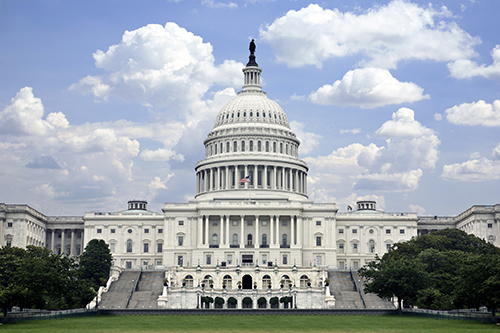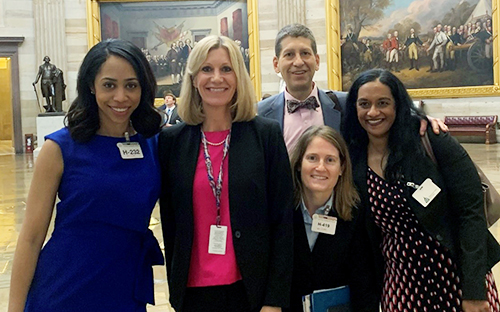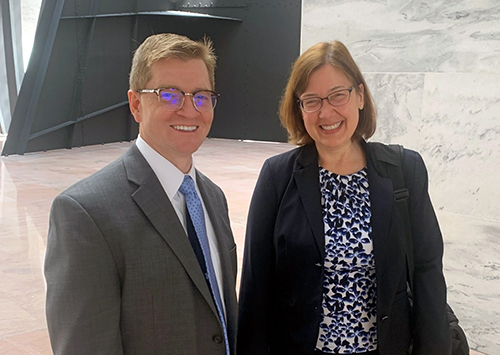
US Capitol. Getty Images
It’s been two years since members of SHM’s Public Policy Committee (PPC) participated in Hill Day—the annual visit to Washington, D.C. to meet with legislators and advocate on behalf of SHM members and their patients. On May 10, 2022, about 20 members of the committee took to the Hill where they met with nearly 40 staffers and legislators from the committee members’ states.
“It was nice to be back on the Hill,” said Rick Hilger, MD, SFHM, the utilization management medical director and hospitalist at HealthPartners in Minneapolis, and SHM’s PPC chair. “It’s been two years since our last Hill Day and there were a lot of new faces.”
The COVID-19 pandemic kept the committee away since 2019 and provided some obstacles for this year’s meetings—but the PPC was not deterred. Because of the ongoing pandemic, the U.S. Capitol and congressional office buildings remain closed to the public. This made arranging meetings between PPC members and congressional staffers even more challenging as staffers had to meet members at predetermined locations and escort them into the building.

SHM members spent the day educating and advising legislators on the issues important to hospitalists and health care. Front, L to R—Sarah Johnson Conway, MD, Ann Sheehy, MD, SFHM, Marta Almli, MD, JD, and Suparna Dutta, MD, MPH, FHM and Back, Brad Flansbaum, DO, MPH, MHM.
“There’s always a bit of uncertainty when scheduling and arranging meetings,” said SHM’s chief legal officer, Josh Boswell. “But this year it was especially challenging. There were inconsistencies in meeting policies—some were remote, some weren’t, and some became remote at the last minute—and on COVID-19 policies. But the PPC members were amazing and took it all in stride.”
During these meetings, PPC members discussed the central role hospitalists played and still are playing in the COVID-19 pandemic, the effect the pandemic has had on hospitalists, Medicare physician fee schedule payment cuts, continuing workforce shortage concerns, and the need to extend several regulatory flexibilities provided throughout the pandemic.
“It was a very productive day. We had an important story to tell,” Dr. Hilger said. “Not just about the last two years, but about how we come out of this global pandemic and try to become a stronger, more sustainable health care system.”
Several members also met with Wendell Primus, the senior policy advisor on budget and health issues in Speaker Nancy Pelosi’s office. Former PPC chair, Ann Sheehy, MD, MS associate professor of medicine and chief of the division of hospital medicine in the department of medicine at the University of Wisconsin-Madison, and Robert Wood Johnson Foundation Health Policy Fellow, helped facilitate the meeting. In her role as a fellow, Dr. Sheehy participates in the federal health policy process in congressional and executive branch offices and works on regulatory and legislative issues related to public health.

Dan Duzan, MD, SFHM and Melinda Johnson, MD, SFHM.
“There isn’t a whole lot of freestanding health care legislation getting done right now,” said Mr. Boswell. “So instead of discussing a particular resolution or bill during the meetings, our goal was to plant seeds on things like prior authorization, opioid use (the X-waiver), and how those issues might relate to other issues.”
According to committee members, congressional offices were receptive to their concerns and found the meetings informative. And, while these topics are important, education is always a key factor in any advocacy meeting. Educating legislators about what hospitalists do, who they are, and how and why their roles in hospitals matter and make a difference are keys to helping them learn and understand why hospitalists’ voices matter.
Within a couple of days after the PPC’s Hill Day, the MAT Act, H.R. 7666, Restoring Hope for Mental Health and Well-Being Act of 2022, which addresses the X-waiver—got added to a mental health package. And, while a lot of people have been working on this issue across the country, SHM has been heavily involved with it, both with members and professionally. The large, bipartisan mental health package was passed by a vote of 402-20 in June.
As part of the process, attendees follow up with the staffers or legislators they met with during Hill Day and remind them of the issues they discussed, provide requested information, and offer their expertise on the issues. For example, one Senate office asked if they could coordinate with the physician member to provide similar education to district offices across the state. And a Florida legislator agreed to cosponsor the Improving Access to Medicare Coverage Act and is looking into supporting extending Public Health Emergency waiver around the hospital at home programs as a result of this year’s meetings.
Despite these wins and the success of Hill Day, advocacy is a long game—it’s showing up, repeating your message, informing legislators, and respectfully presenting your issues. Mr. Boswell said after being off the Hill for two years it “felt like starting over in educating staffers and legislators about hospitalists and the issues important to them.”
“I think it was a reset day,” Dr. Hilger said. “The staff we met with were sharp and hospital medicine has been around for more than two decades, but there are still people who don’t know what a hospitalist is. Some of the staff we spoke with were surprised to discover that all the things they’ve been reading about for the last two years about frontline workers—that’s us. That’s us and nurses, and care management, emergency departments, and critical care—all our colleagues. But hospital medicine was right in the middle of it all.”
Dr. Hilger, who’s been on the PPC since 2012 and attended about seven or eight Hill Days, said it was the right time and the right place to remind everyone of who hospitalists are and how critical they are to a functioning, productive, high-quality, health care system. “There were some eye-opening moments in those meetings,” he said.
Though education is always part of advocacy meetings, the agenda is fluid and depends on what legislators are focusing on at the time. Planning Hill Day starts with SHM staff working with PPC members to prioritize the legislative issues, which are then informed by what is most relevant on the Hill at any given time. For example, addressing issues around observation status has historically been a big legislative issue with SHM, but if the Hill is currently focused on prior authorization and the opioid crisis, the PPC will shift into highlighting SHM-supported legislation that’s relevant to that ongoing discussion.
“It was a good opportunity to give feedback to the people in positions of making health care policies,” Dr. Hilger said. “We also thanked them for the COVID-19 waivers—specifically telemedicine and prior authorization waivers—those were extremely helpful during our surges. We explained what we’ve learned and told them how the future could be if we take these learnings and realize that we if remove unnecessary obstacles in the health care system, we can provide our patients with highly-efficient, lower-cost, quality care without the hurdles.”
SHM members can help by joining the SHM Grassroots Networks and sending messages to their representatives. This is extraordinarily helpful in increasing SHM’s reach and getting attention paid to issues important to hospitalists.